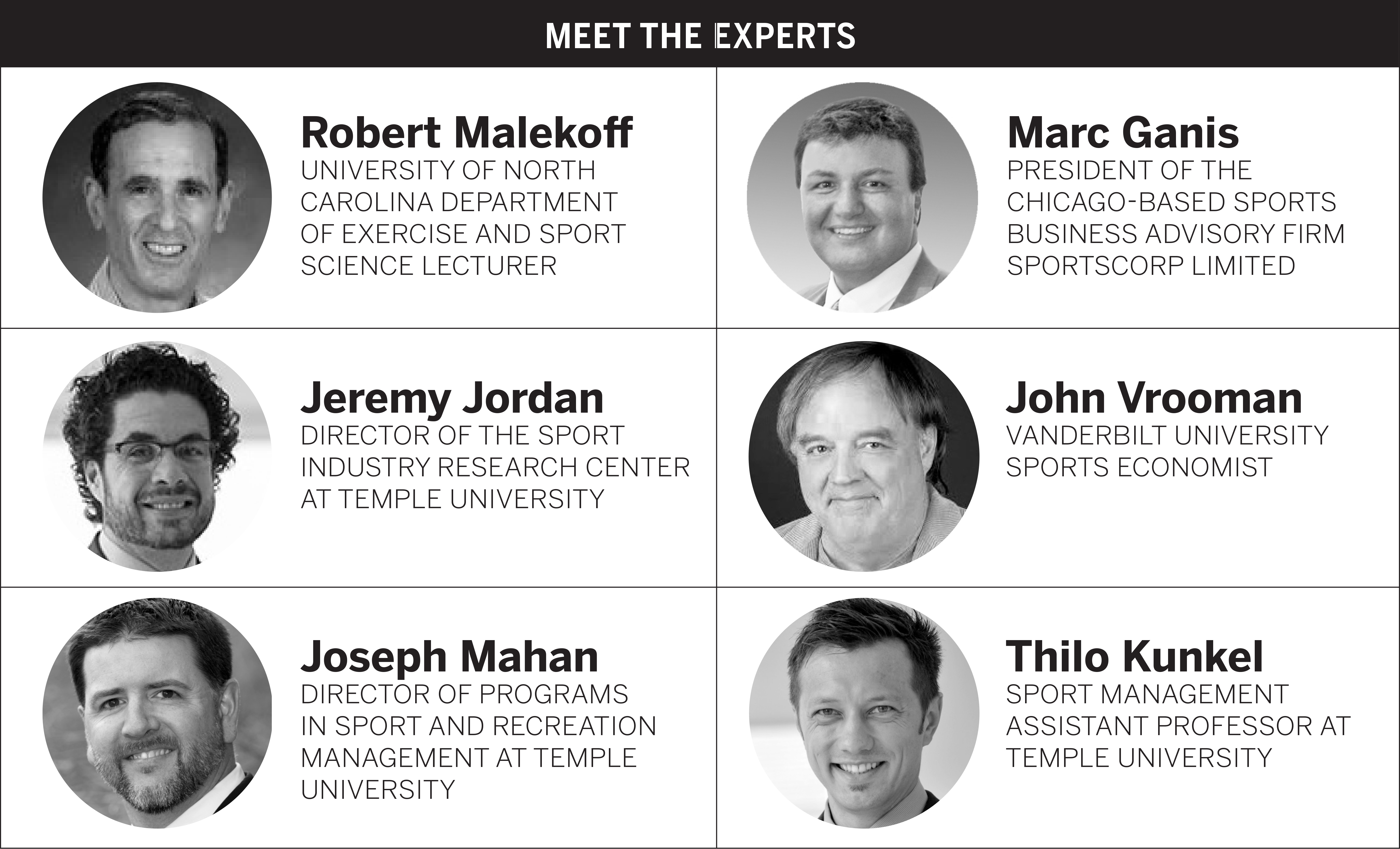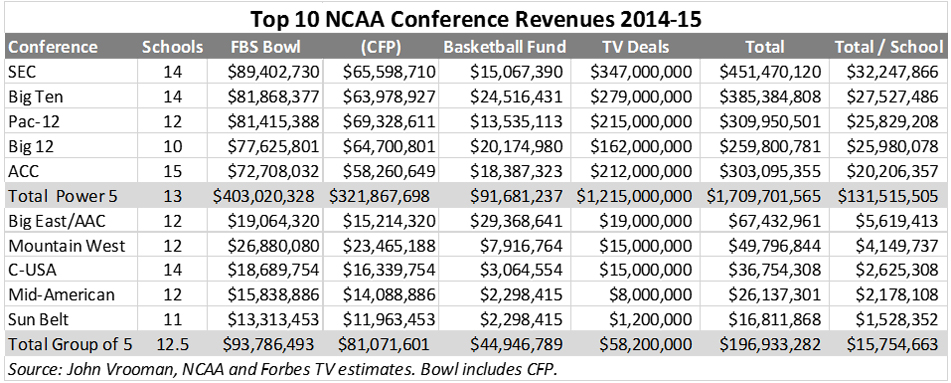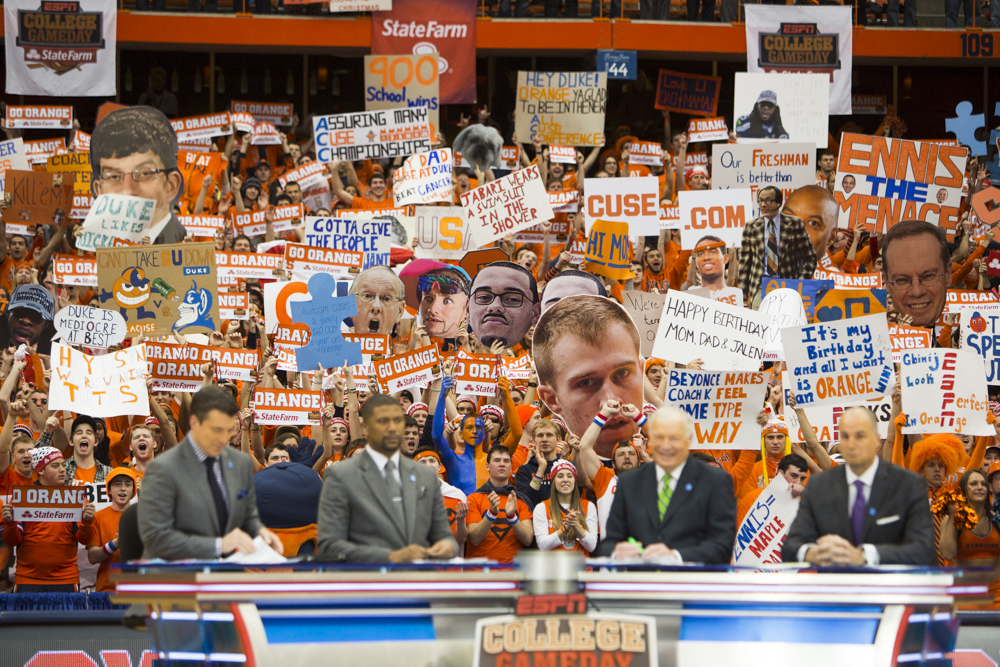What John Wildhack’s hiring could mean for Syracuse: 6 experts weigh in
Courtesy of SU Athletics
Six experts weighed in on Syracuse hiring John Wildhack as its new AD. Here's what they had to say.
Days after Syracuse named John Wildhack as its new director of athletics, The Daily Orange spoke with six sports business experts about what the former ESPN executive could mean for the university, Atlantic Coast Conference and related media. Wildhack replaces Mark Coyle, who left Syracuse in May to become Minnesota’s director of athletics.
The Daily Orange spoke with the six experts featured below. These are excerpts from the conversations.

Clare Ramirez | Presentation Director
The Daily Orange: Any first reactions to the Wildhack hire?
Robert Malekoff (North Carolina): Wow, here’s somebody who would be great about the proposed ACC Network. He’s a phenomenal resource for the conference. If I’m an AD in an ACC office, I’m thinking what could this guy do for us to collectively strengthen our brand? From that perspective, it’s a pretty interesting hire.
Marc Ganis (Sportscorp Limited): He was one of the most powerful and influential people in the sports industry. This is a man who has been in the middle of virtually every major sports broadcast negotiation in the last decade. He knows how calculations are done, where sensitivities are and where the values are to selling rights. It’s basically like hiring your competitor’s lawyer — you get a lot of good inside information. That can only serve to help the ACC.
John Vrooman (Vanderbilt): On the surface, the hiring of Orange blood ESPN producer as AD at Syracuse seems to be a nostalgic dream job for a sports media savvy alum, but a somewhat risky outside the box move with a potentially high pay-out for all of the ACC.
This hiring could benefit the Orange bottom line. More important, as the result of the virtual vertical integration of ESPN and the ACC, the ultimate prize will probably soon be a standalone ACC Network (not Raycom Media affiliated) that allows ACC schools to share in the media prize money and keep pace with the SEC and Big Ten networks.
Thilo Kunkel (Temple): With the increased importance of media rights, I believe he can leverage his experience with ESPN and his network to strategically position SU for a successful future. This could include media deals, switching conferences or signing strategic partnerships with high-profile sponsors.
The D.O.: Can his experience in contract negotiations help him negotiate deals for the ACC? How?
Joe Mahan (Temple): I don’t know if it helps him get deals. Just because he was on the other side does not guarantee the ACC anything. I would not be surprised if the conference looks to him early in his tenure. Certainly I would think when contracts are up they would pick up the phone and call him.
Kunkel: Having him come with a fresh, clean slate, brings in a whole different perspective. They’ll use his acumen to integrate media related businesses. Syracuse has amazing content from its successful teams. With media connections, he can leverage that strength of SU pretty well.
Malekoff: We’re moving into an era for broadcasting toward streaming. There seems to be a new development almost every year. He’ll be able to provide some insight there. I can’t imagine he wouldn’t be a person with experience invaluable in determining how to move forward along those lines.
Those on search committee probably said look, here’s a guy who really understands broadcasting, one of our key revenue streams. You hire people to do the things you don’t have as much experience in. Division I sports is a big business within an educational framework. You need people with superb business acumen today more than ever before because of the financial pressures.
The D.O.: What sort of financial pressures?
Malekoff: There are two issues here. In order to compete, there’s more money than ever that has to be spent. Coaching salaries, facilities, student services for athletes, there seems to be no end in sight here. You have to figure out a way to raise that money. Schools in the Power 5 are fortunate that they come together as a group and generate shared income.
The other side is regardless of how successful a school is, with a few exceptions, you have to figure a way to spend that money and budget it wisely. There are a handful of exceptions, but teams can’t be successful without being fiscally responsible.

The D.O.: What’s the impact on other ACC schools and is there a possible free-rider effect here?
Jordan: The primary benefit to other schools may be with ESPN-related issues. They may call Wildhack, who would be available to help. He probably wasn’t available before. He’s maybe able to leverage media rights and TV deals to a greater degree than past ADs could.
Kunkel: There may be a benefit for other schools in his expertise. I don’t think it’s related to the one conference. Most conferences, most TV deals have been negotiated a long time in advance, so I see a more localized media influence for Syracuse. I don’t foresee too many free-rider effects but he can only help.
The D.O.: Localized, in what sense?
Kunkel: University specific. Fostering those relationships and taking them to a new level. Leveraging other direct revenue sources. Maybe even cutting out those external media sources and making that connection in house. He could help SU develop its own channels and streams, develop its own media outlets and its own content, rather than a conference wide network.
Bigger universities would gain benefit from breaking away from conference specific media deals where smaller ones benefit more from conference and league rights media deals. I don’t think Syracuse would jeopardize its relationship with the ACC. I could see maybe not an impact on TV deals but potentially on some of the content outside of major games. We’re talking about insights from training camp, behind the scenes access, Snapchat, social media. Taking media outlets and bringing them together in a more strategic manner. That’s what drives fan engagement.
The D.O.: Do you have an example of that?
Kunkel: The European soccer giants Manchester City FC and FC Bayern Munich do a phenomenal job in providing fans with access through their own TV channels. They’re getting big financial benefits out of it by having people subscribe to their channels and selling sponsorships.
The D.O.: Could this change the relationship between Syracuse and the ACC?
Mahan: I don’t see it necessarily changing that. But Wildhack’s going to liaise with the conference to make sure things continue smoothly. When you bring somebody in at the top, it’s the job of that person to rally the troops, bring people in and delegate.
His hire is no small point. He comes from an organization that is inextricably linked with college athletic conference conferences. So I do think it should be an interesting honeymoon period between the ACC, SU and ESPN given the state of contract agreements. You have somebody who has been behind the scenes.

Daily Orange File Photo
The D.O.: Could Wildhack be among a series of outside-the-box hires, where schools look beyond the typical AD pedigree? Notre Dame, Alabama and Michigan also have hired first-time athletic directors.
Jordan: We’re moving away from the days the head football coach becomes the AD. You want people trained in sports business. At Syracuse, an AD’s primary function is relating with external groups and managing fundraisers. If you can manage people at ESPN, you can manage people at Syracuse. You bring someone in who is completely from the other end. Look at Michigan, they hired the CEO of Domino’s (Dave Brandon) because he has a strong business background.
Mahan: It’s not unprecedented. This is an experiment that’s been tried in the past. I hesitate to call it a trend just yet. There’s money swirling around in college football, the playoffs, bowls. It’s not at all surprising. I think this was a move made with a fiscal approach in mind.
Malekoff: For a while in the Ivy League, it was very common to hire people from outside of athletic administration. And nothing has really changed. College athletics is a big business. That’s the way these big time programs are going.
The D.O.: Can you put a price tag on his hire?
Ganis: He had a great status and visibility. He was probably making $5 million plus dollars a year at ESPN between salary and stock options. Disney stock has been on a rocket trajectory. He’s going right up there with top flight ADs.
The D.O.: Anything else you’d like to add?
Vrooman: As more and more cable subscribers are streaming sports programming and cutting the cable cord, the line between cable producers like ESPN and their base sports product is becoming increasingly blurred beyond distinction. The labor market for college and NFL coaches has already effectively merged, and this move reflects the vertical integration of the sports media production process.
Ganis: It also could help Syracuse because he’ll bring expertise and broadcasting experience that is second to none in the ACC as well as nationally. I can’t imagine he took this job to have Syracuse football remain the way it is. Expect him to seriously upgrade the football program.
Malekoff: Sports is somewhat unique as a business. You’re competing. Syracuse wants to beat teams. But you’re cooperating because you lean on one another financially. Once the NCAA tournament is set, the teams that didn’t make it want the teams in their league to excel there because it means more prestige for the league and more money for each team. They’re competing but also cooperating.
Jordan: Athletic directors play a big part in what a conference does. Any kind of direction the conference takes, be it media contracts or expansion, AD’s have a voice. This gives them as a group an additional degree of knowledge of the process. They value sport programming highly. He can make the calls and have the conversations that may be helpful to better position the league.
Published on July 11, 2016 at 12:48 am
Contact Matthew: mguti100@syr.edu | @MatthewGut21
Related Stories
- 8 things to know about new Syracuse Director of Athletics John Wildhack
- Storify: Syracuse community reacts to Syracuse naming John Wildhack its new AD
- Storify: ESPN employees react to Syracuse hiring John Wildhack as new AD
- 5 things Daniel French and Rick Burton said about hiring John Wildhack as Syracuse's Director of Athletics
- Mark Coyle needed home to do his job, and he found it in Minnesota





